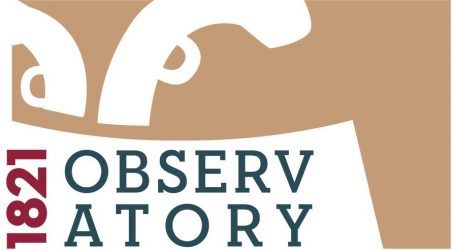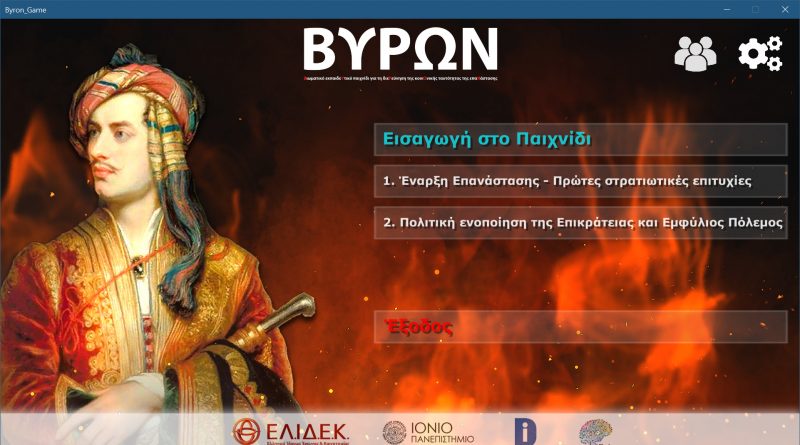Playing with the social identities of the Greek Revolution
The bicentenary celebrations for the 1821 Greek Revolution mainly involve events, exhibitions, book presentations, etc. A different anniversary approach came from the history and informatics departments of the Ionian University. The serious game Byron (an experiential educational game to explore the social identity of the revolution) was funded by the Hellenic Foundation for Research and Innovation and aims to approach the Greek Revolution in a creative way. Game users “engage” with moments of the revolution to learn which social groups took part in it.[1] Its originality lies in the fact that users will not just watch moments of the revolution, but will “interact” with the content that the researchers have created.
Digital games are nowadays a particularly “influential” medium, since young people, and not only, are interested in acquiring “real” experiences through participating in them.[2] Games engage users with content created by developers and focus on the experiential relationship that develops between players and the theme of each game. Digital games, as a means of mediating knowledge, are capable of presenting in a critical way what happened in the past. This is not always the case, since we notice that several games are only interested in rendering very good representations of their subjects, without considering the content and the experience the user will get from it. On the other hand, serious games incorporate pedagogical techniques to impart knowledge and skills to learners.
Byron uses elements of strategy games combined with elements of problem-solving games, so users need to critically manage historical content from the start of the Greek Revolution to 1827. Users are exposed to four missions that they can play, autonomously or in consecutive order: a) the start of Greek Revolution and first military successes (battle of Valtetsi, capture of Tripolitsa, battle of Dervenakia); b) the political unification of the territory and civil war (from the regional senates to the National Assembly, consolidation of national administration and civil war); c) Messolonghi during the struggle (the role and contribution of philhellenes, the sortie); and d) the critical years of 1824–1827 (defence at sea and on land, diplomatic events).[3]
The particularity of this game lies in the fact that users are asked to choose a social group, as well as an allied social group, with which they will be able to face the challenges presented by the game. Users are also involved with economic, social and political issues, depending on the social class they have chosen to join. At the same time, they come into contact with the problems and challenges faced by the fighters of the revolution, with the historical information shown to them on the screen. The multimodality of the content helps to engage the users through a lot of information, much more, and in a non-linear presentation, than that of a history book. The experiential approach highlights users’ direct contact with historical elements and events of the revolution, as they face the challenges presented to them in the game as if they were living in the 19th century.
This game as a different celebratory experience helps us realise that the 21st century has incorporated new determinants in the way of receiving the historical past. The celebration of the bicentenary of the Greek Revolution is not only a new reference to the important events and persons, but also an “immersion” in 19th-century society. Experientiality is the main property of the game: if you don’t decide to actively engage, you won’t experience it, you won’t understand, you won’t feel and you won’t perceive the associations of the content. Thus the 21st century takes us away from a simple celebratory representation and leads us to the new challenges of the embodied experience of the historical past.
Elias Stouraitis, Postdoctoral Researcher of History and Ethnology Department DUTΗ
[1] The game is here: https://hilab.di.ionio.gr/byron/.
[2] See Adam Chapman, Anna Foka and Jonathan Westin, “Introduction: What is Historical Game Studies?” Rethinking History 21, no. 3 (2016): 358–71, https://doi.org/10.1080/13642529.2016.125663.
[3] “ΒΥΡΩΝ: ένα σύγχρονο εκπαιδευτικό ψηφιακό παιχνίδι για την Ελληνική Επανάσταση (1821)” [Byron: A modern educational digital game about the Greek Revolution], Νέα Παιδεία – Γλώσσα, https://neapaideia-glossa.gr/articles/917/.
The image comes from the “Byron” game page: https://hilab.di.ionio.gr/byron/

